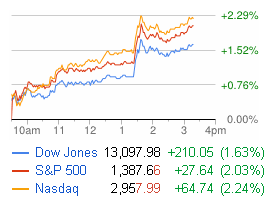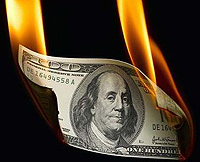 by Chris Banescu –
by Chris Banescu –
The latest economic data released Thursday confirms what all Americans, especially business owners, already knew. Economic growth has slowed down to a measly 1.5% (from 2% the previous quarter), job growth continues to languish with nationwide unemployment at a dismal 8.2%, consumer confidence has fallen to its lowest level this year, and consumer spending is also tanking. Household purchases, which represent approximately 70% of GDP, grew at the slowest pace in a year. Recent surveys show that Americans have lost approximately 40% of their net worth in the last few years, and poverty rates are reaching levels not seen in this country since the 1960s.
So, why are the markets up? [Read more…]

 by Alyson Shontell –
by Alyson Shontell – by Roger Martin –
by Roger Martin – by Mitch Tuchman –
by Mitch Tuchman –